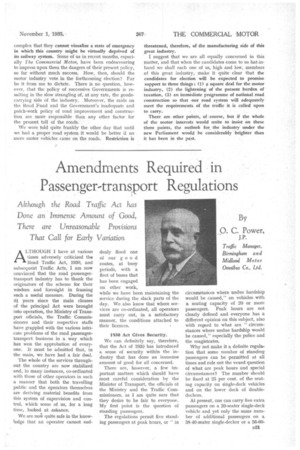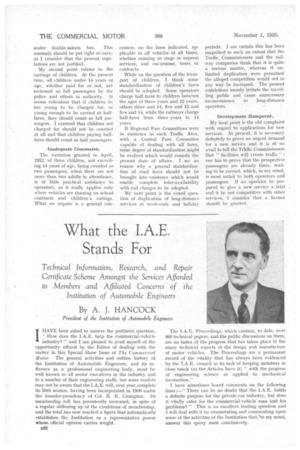Amendments Required in Passenger-transport Regulations
Page 79

Page 80

If you've noticed an error in this article please click here to report it so we can fix it.
By O. C. Power, Although the Road Traffic Act has Done an immense Amount of Good, There are Unreasonable Provisions That Call for Early Variation
ALTHOUGH I have at various times adversely criticized thia Road Traffic Act, 1930, and subsequent Traffic Acts, I am now convinced that the road passengertransport industry has to thank the originators of the scheme for their wisdom and foresight in framing such a useful measure. During the 4i years since the main clauses of the principal Act were brought into operation, the Ministry of Transport officials, the Traffic Commissioners and their respective staffs have grappled with the various intricate problems of the road passengertransport business in a way which has won the approbation of everyone. It must be admitted that, in the main, we have had a fair deal.
The whole of the services throughout the country are now stabilized and, in many instances, co-ordinated with those of other operators in such a manner that both the travelling public and the operators themselves are deriving material benefits from this lystein of supervision and control, which some of us, for a long time, looked at askance.
We are no;v quite safe in the knowledge that an operator cannot sud
denly flood one of our good routes, at busy periods, with a fleet of buses that has been engaged on other work, while we have been maintaining the service during the slack parts of the day. We also know that where services are co-ordinated, all operators must carry out, in a satisfactory manner, the conditions attached to their licences.
1930 Act Gives Security.
We can definitely say, therefore, that the Act of 1930 has introduced a sense of security within the industry that has done an immense amount of good for all concerned.
There are, however, a few important matters which should have most careful consideration by the Minister of Transport, the officials oi the Ministry and the Traffic Commissioners, as I am quite sure that they desire to be fair to everyone. My first point is the question of standing passengers.
The regulations permit five standing passengers at peak hours, or " in circumstances where undue hardship would be caused," on vehicles with a seating capacity of 20 or more passengers. Peak hours are not clearly defined and everyone has a different opinion on this subject, also with regard to what are " circumstances where undue hardship would be caused," especially the police and the magistrates.
Why not make it a definite regulation that some number of standing passengers can be permitted at all times and rule out the vexed question of what are peak hours and special circumstances? The number should be fixed at 15 per cent. of the seating capacity on single-deck vehicles and on the lower deck of doubledeckers.
At present, one can carry five extra passengers on a 20-seater single-deck vehicle and yet only the same number of additional passengers on a 38-40-seater single-decker or a 56-60 seater double-saloon bus. This anomaly should be put right at once, as I consider that the present regulations are not justified.
'My second point relates to the carriage of children. At the present time, all children under 14 years of age, whether paid for or .not, are reckoned as full passengers by the police and others in authority. It seems ridiculous that if children be too young to be charged for, or young enough to be carried at halffares, they should count as full passengers. I contend that children not charged for should not be counted at all and that children paying halffares should count as half passengers.
Inadequate Concession.
The variation granted in April, 1932, of three children, not exceeding 14 years of age, being counted as two passengers, when there are not more than two adults in -attendance, is of little practical assistance to operators, as it really applies only where vehicles are running on school contracts and children's outings. What we require is a general cdn
cession, on the lines indicated, applicable to all vehicles at all times, whether running on stage or express services, and excursions, tours or contracts.
While on the question of the transport of children, I think some standardization of children's fares should be adopted. Some operators charge half-fares to children between the ages of three years and 12 years, Others three and 14, five and 12 and five and 14, while the railways charge -half-fares from three years to 14 years.
If Regional Fare Committees were in existence in each Traffic Area, with a Central Fare Committee capable. of dealing with all fares, 'sortie degree of standardization might be evolved which would remedy the present state of affairs. I see no reason why a general standardization of road fares should not be brought into existence which would enable complete inter-availability with rail charges to be adopted.
My next point is the vexed question of duplication of long-distance services at week-ends and holiday periods. I am certain this has been magnified to such an extent that the Traffic Commissioners and the railway companies think that it is quite a serious matter, whereas if unlimited duplication were permitted the alleged competition would not in any way be increased. The present restrictions merely 'irritate the travelling public and cause unnecessary inconvenience to long-distance operators.
Development Hampered.,
My final point is the old complaint with regard to applications for new services. At present, it is necessary definitely to prove an urgent demand for a new service and it is of no avail to tell the Trhffic Commissioners that " facilities will create traffic " ; one has to prove that the prospective passengers are already there, waiting to be carried, which, to my mind, is most unfair to both operators and passengers. If an operator be prepared to give a new service a trial and it be not competitive with other services, -I consider that a licence should he granted.
















































































































































































